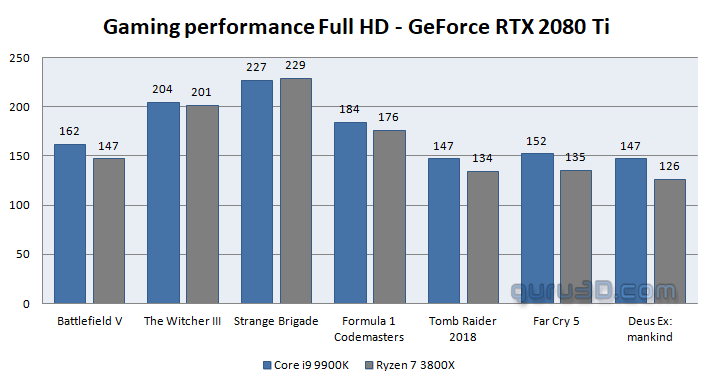Conclusion
Final Words
So that's that, we have been able to take a good look at the Ryzen 7 3800X processor. There's one more left in September, the 16-core part. The 3800X is half that in the sense that it has 8-cores and 16-threads. The processor managed to seriously impress me as the 3800X (MSRP 399 USD) can fight with intel's 9900K (MSRP 599 USD) on all fronts. Especially desktop workloads where treading is needed, well the processor kills anything and everything thanks to its snazzy fast 4.5 GHz turbo bin and the 3.9 GHz base clock. Gaming wise Intel still holds a small lead, but that's extremely relative as we measure pretty much non-GPU bound with a 1250 EUR costing GPU. Compared to team blue. Of course, there will be wins and losses on both sides, but overall AMD has got the better and more affordable platform infrastructure to offer as X570 thus is not mandatory. Also, keep in mind it is a far more-secure processor.
Price and value
Gaming performance
Previous Ryzen reviews have taught me that it is extremely hard to convince a big part of the guru3d community and reader base that Ryzen 1000/2000 was plenty fast for gaming, at least mainstream gaming. For the new Zen2 Matisse based processors that will be less difficult. Combined with the respective platform, ZEN2 offers far more oomph compared to the previous two generations Ryzen processors. There are mostly wins for Intel, there will be wins for AMD based on competing and price level matched processors. It's a much closer call to make, and that by itself is a win for AMD all thanks to the increased IPC and clock frequencies. We do feel that the gaming performance charts were a bit out of perspective, so I created another 1920x1080 chart showing all the games we tested against the 600 USD flagship Intel Core i9 9900K. This is the reality with the fastest and severely expensive 1250 EUR costing consumer GPU available on the planet, the GeForce RTX 2080 Ti:
So based on the fastest consumer card on the globe, the GeForce RTX 2080 Ti, we can calculate and average out maybe a 5% to 10% advantage for the 9900K compared to the 3800X. Keep in mind that a way cheaper 6-core 3600X isn't that far off either. Sometimes Ryzen 7 3800X is even faster thanks to that 3900 MHz base-clock with many threads active or when a game likes fast single threads 4500 MHz turbo. With varying differences per game title, of course. Guys, this is how close things have gotten in the year 2019 with Ryzen 3000. We did pick Intel's most expensive 8-core proc here and, again, who really owns an RTX 2080 Ti? So with a slower card like a 5700 or 2070, the results will be even closer towards each other due to GPU limitation.
DDR4 Memory
Memory compatibility should not and likely will not be an issue as long as you stick to recently released DIMMs. I'll keep repeating this, but there are some really good Ryzen optimized kits out there. With Ryzen Generation 3 you can go higher in DDR4 clock frequency if you want to. We advise that up-to 3600 MHz and CL16 is fine, after that frequency value a 2:1 divider kicks in, and that can have an effect on the Infinity Fabric bandwidth, inter-core CCX bandwidth. We see no reason for faster DDR4 memory anyways, it's expensive and does not bring in added perf, much like what you see on Intel platforms as well.
Energy efficiency
With these processors now fabbed at 7nm you may see some interesting energy efficiency, the 105 Watts listed for the 3800X was not necessarily something we could measure anywhere and thus remains relative, of course, that all is amazing all by itself. Mind you these are numbers at nominal load. Not your continuous power draw. Overall the 3800X is idling a bit higher than expected, but that is likely due to the motherboard (extra ICs do use extra power). The load values are excellent.
The conclusion
The Ryzen 7 3800X is a seriously impressive processor. It delivers at all fronts and if you stick to a series 400 motherboard, you will like what you get in terms of value versus performance. The proc remains close or even faster than a 9900K. For gaming, Intel still has a marginal lead, but that only goes for a system with the fastest and most expensive GPUs available on this globe. One thing keeps going through my mind though, the 3700X. It's a notch slower at best, but is 70 USD cheaper and ultimately I would steer you in that direction if you are okay with slightly slower performance. Compared to Intel I'd say that Ryzen 7 3800X all-around is more interesting than a Core i7-9700K, but in between a 9900K or 3800X remains a somewhat personal choice I guess. The fact that choosing in between the two is a hard thing means that AMD did an impressive job with ZEN2 alright.
If your PC is just for gaming and you have a more narrow budget I'll even advance on that. While I prefer 8 cores and would recommend you a 6-core 3600 or 3600X, for example, can be purchased at 199/249 USD and these have the same benefits that ZEN2 offers, overall faster than Intel desktop performance thanks to very good IPC and the proper Turbo bins with close to similar gaming performance. Man, AMD is so strong at this moment in time.
Not just the performance or value, but also they offer safer and less vulnerable processors as well. Overclocking is the weak spot for Ryzen. Where in the past you could easily find 10% more performance in a product, these days all manufacturers driver their products closer towards their maximum. That takes the fun out of tweaking, then again .. you'll run a processor that already is close to its max and that saves you the time and sometimes frustration of overclocking. Ergo, we do not recommend to tweak AMD procs anymore in the year 2019. And that is not necessarily a bad thing you guys. With all that said and done, we have now tested all available Ryzen 3000 processors. The 16-core (Ryzen 9 3950X) part will be released in September 2019, obviously, we'll review that beast of a proc as well. Remember as Guru3D top tip, with a B450/X470 motherboard the perf, bang, and bucks ratios will offer you a magnificent combo. While in that mindset we do need to recommend you to save 70 bucks with the most excellent Ryzen 7 3700X plain and simple, but we also have to acknowledge that the Ryzen 7 3800X is a bit of a gem.
- Sign up to receive a notification when we publish a new article
- Or go back to Guru3D's front page.




